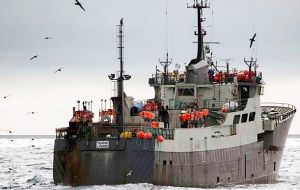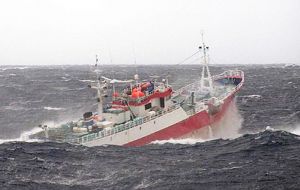MercoPress. South Atlantic News Agency
Sea Shepherd breaks record for world's longest sea chase of a poaching vessel
 Nigerian flagged poacher 'Thunder' has covered the entire Banzare Bank with gillnets exceeding 100 kilometers in length (Pic The Telegraph)
Nigerian flagged poacher 'Thunder' has covered the entire Banzare Bank with gillnets exceeding 100 kilometers in length (Pic The Telegraph)  The previous record of 21 days was set in 2003 by the Australian patrol vessel, Southern Supporter when it chased the Uruguay-flagged Viarsa I
The previous record of 21 days was set in 2003 by the Australian patrol vessel, Southern Supporter when it chased the Uruguay-flagged Viarsa I On Thursday, the Sea Shepherd ship, Bob Barker, marked the 22nd day of its pursuit of the Interpol-listed poaching vessel, Thunder. In doing so, the conservation ship has broken the record for the world's longest sea chase of a poaching vessel.
The ships are now approximately 1,000 nautical miles south-east of South Africa.
The previous record of 21 days was set in 2003 by the Australian patrol vessel, Southern Supporter, when it chased the Uruguay-flagged Viarsa I across the Southern Ocean. The Viarsa I fled after it was accused of poaching Patagonian toothfish inside Australia's Exclusive Economic Zone.
Bob Barker Captain, Peter Hammarstedt, stated, “Eleven years ago, the Southern Supporter bravely embarked on a high-seas chase like no other in history, to defend our oceans from those who would profit from its destruction. Today, the Bob Barker pays homage to their efforts, as we continue to chase the wanted poaching vessel, Thunder, further away from their hunting grounds in shadow-lands of the Southern Ocean. The poachers have led us through treacherous ice and stormy seas, and continue to try to out-will us at every turn. But we remain undeterred, stead-fast in our pursuit, resolute in our commitment to ensure that these poachers receive justice for the devastation they have left in their wake.”
Meanwhile, the Sea Shepherd ship, Sam Simon, continues mammoth operations to retrieve illegal gillnets, abandoned by the Thunder inside the Commission for the Conservation of Antarctic Marine Living resources (CCAMLR) area of management, when it fled from the Bob Barker on December 17.
The Sam Simon completed the retrieval of the first illegal gillnet on December 29. In an operation that spanned five days, the crew hauled 25 kilometers of illegal gillnet out of the Antarctic waters. Over 200 toothfish and other marine creatures were found dead in the net.
Retrieval of the second “monster”, which measured 19 kilometers, was completed last Tuesday. While slightly shorter than the first net, the “monster” net contained over twice the catch of the previous haul. Approximately 500 toothfish, and hundreds of other marine creatures were found dead, many in advanced stages of decomposition.
Having successfully retrieved two illegal gillnets, Sam Simon Captain, Sid Chakravarty, has confirmed the presence of at least two more gillnets in the area.
He said, “The Thunder has been mocking CCAMLR’s conservation measures and its Member states for over ten years. The poaching vessel has covered the entire Banzare Bank with gillnets exceeding 100 kilometers in length. These curtains of death, criss-cross the seabed in every direction, is decimating vulnerable toothfish populations and the Antarctic Marine Ecosystem. In addition to this, we know that the by-catch numbers of these banned gillnets are equal to the targeted catch numbers; a statistic that would be an outrage in any regulated fishery.”
The use of gillnets has been outlawed by CCAMLR since 2004, and the Commission has specifically expressed concerns regarding the impact of this fishing method on the marine ecosystems of Antarctica.
A known poaching vessel, the Nigerian-flagged Thunder was issued with an Interpol Purple Notice following a joint effort by Norwegian, New Zealand and Australian authorities, and is currently included on CCAMLR’s black-list of Illegal, Unreported and Unregulated (IUU) fishing operators.
Operation Icefish is Sea Shepherd’s 11th Southern Ocean Defense Campaign, and the first to target IUU toothfish fishing operators in the waters of Antarctica.
Sea Shepherd Australia is a non-profit conservation organization whose mission is to end the destruction of habitat and slaughter of wildlife in the world’s oceans in order to conserve and protect ecosystems and species. Sea Shepherd Australia uses innovative direct-action tactics to investigate, document, and take action when necessary to expose and confront illegal activities on the high seas. By safeguarding the biodiversity of our delicately balanced oceanic ecosystems, Sea Shepherd Australia works to ensure their survival for future generations.




Top Comments
Disclaimer & comment rules-

-

-

Read all commentsMuch easier to just sink the poachers. When you are down near Antartica, who's going to see?
Jan 09th, 2015 - 11:57 am 0Sink a dozen boats and they will learn to stop going there.
Just one question. Where is Sea Shepherd's legal authority?
Jan 09th, 2015 - 01:39 pm 0If I were younger, I would join their ship in a hear beat!
Jan 09th, 2015 - 01:45 pm 0Commenting for this story is now closed.
If you have a Facebook account, become a fan and comment on our Facebook Page!